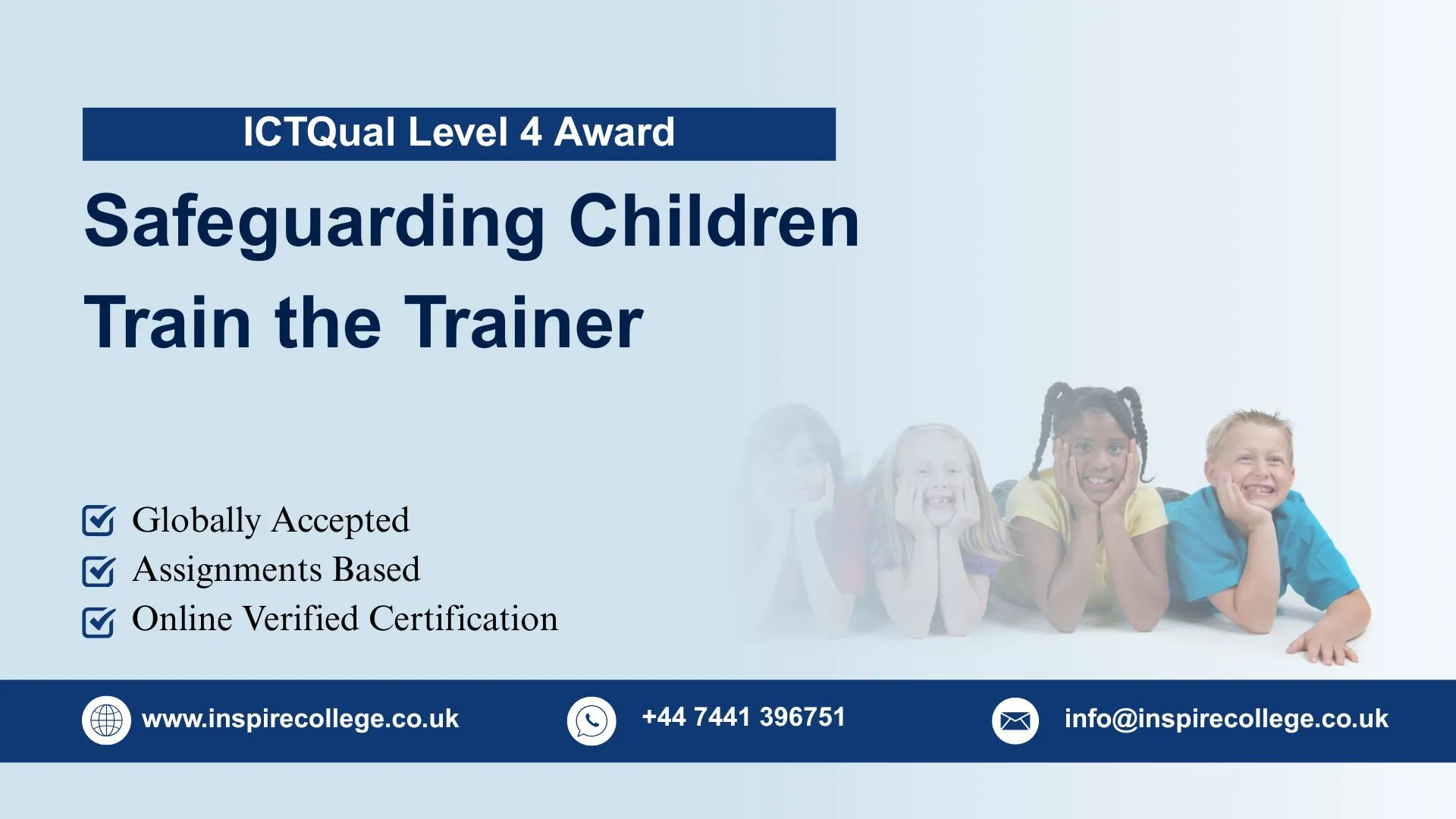
ICTQual Level 4 Award in Safeguarding Children Train the Trainer
The ICTQual Level 4 Award in Safeguarding Children Train the Trainer is a comprehensive qualification aimed at individuals who are responsible for delivering training to others on the crucial topic of safeguarding children. This award equips professionals with the skills and knowledge necessary to effectively educate and empower others, enabling them to recognise and respond to safeguarding concerns.
Safeguarding children is a critical responsibility for all professionals working with children and young people. The need for qualified individuals who can train others on the subject has become increasingly urgent. The ICTQual Level 4 Award focuses on ensuring that trainers are not only proficient in safeguarding practices but also in delivering engaging, informative, and practical training sessions. The award is designed to develop trainers who can convey complex safeguarding issues in a manner that is accessible and understandable to diverse audiences.
Holding the ICTQual Level 4 Award in Safeguarding Children Train the Trainer opens up a range of professional opportunities. This qualification not only ensures that trainers possess the expertise to lead high-quality safeguarding training but also helps organisations maintain compliance with safeguarding regulations. It enables professionals to play a pivotal role in creating safer environments for children by ensuring that those who work with them are well-equipped to identify and address potential risks.
The ICTQual Level 4 Award in Safeguarding Children Train the Trainer is a vital qualification for professionals who wish to lead safeguarding training in their organisations. By equipping trainers with both in-depth knowledge and the practical skills required to deliver effective training, the qualification ensures that the critical issue of child protection remains a top priority within the workplace. Investing in this qualification not only benefits individuals but also enhances the overall safety and well-being of children and young people across the UK.
To enrol in the ICTQual Level 4 Award in Safeguarding Children Train the Trainer, applicants typically need to meet the following criteria:
- Minimum age of 19 years at the time of enrolment
- A Level 3 qualification or equivalent in a relevant subject (e.g. safeguarding, education, health and social care)
- At least 2 years of professional experience in a role involving safeguarding or working with children and young people
- A good standard of written and spoken English; learners should be able to understand and communicate complex information effectively
Mandatory Units
The ICTQual Level 4 Award in Safeguarding Children Train the Trainer qualification consists of 9 mandatory units required for completion.
Mandatory Units
| Unit# | Unit Title |
| 1 | Introduction to Safeguarding Children |
| 2 | Safeguarding Procedures and Risk Assessment |
| 3 | Communication and Interviewing Skills |
| 4 | Child Development and Impact of Abuse |
| 5 | Legal and Ethical Considerations in Safeguarding |
| 6 | Designing and Delivering Safeguarding Training |
| 7 | Assessing Learners and Evaluating Training Effectiveness |
| 8 | Safeguarding Policy Development and Implementation |
| 9 | Reflective Practice and Continuous Improvement |
Here are the learning outcomes:
1. Introduction to Safeguarding Children
- Understand the fundamental principles of safeguarding children.
- Identify signs and indicators of abuse and neglect.
- Explain the roles and responsibilities of individuals in safeguarding settings.
- Recognise the importance of early intervention and timely response.
2. Safeguarding Procedures and Risk Assessment
- Describe key safeguarding procedures and referral processes.
- Conduct effective risk assessments related to child protection.
- Understand how to manage and record safeguarding concerns.
- Identify appropriate responses to various safeguarding scenarios.
3. Communication and Interviewing Skills
- Demonstrate effective communication techniques in safeguarding contexts.
- Understand how to engage with children in a supportive and non-threatening manner.
- Apply interviewing skills for obtaining accurate information in safeguarding cases.
- Recognise barriers to communication and how to overcome them.
4. Child Development and Impact of Abuse
- Understand key stages of child development.
- Analyse how different types of abuse affect physical, emotional, and cognitive development.
- Recognise behavioural indicators of trauma and neglect.
- Use child development knowledge to inform safeguarding decisions.
5. Legal and Ethical Considerations in Safeguarding
- Identify relevant legislation, statutory guidance, and policies related to safeguarding.
- Understand the legal responsibilities of practitioners and trainers.
- Discuss ethical issues including confidentiality and data protection.
- Apply legal and ethical principles to real-world safeguarding scenarios.
6. Designing and Delivering Safeguarding Training
- Plan safeguarding training sessions aligned with learning objectives.
- Create inclusive and engaging training materials.
- Deliver training using appropriate teaching methods for adult learners.
- Adapt training delivery to suit different learner needs and environments.
7. Assessing Learners and Evaluating Training Effectiveness
- Apply methods for assessing learner understanding and progress.
- Use formative and summative assessment techniques in training.
- Evaluate the effectiveness of training sessions using feedback and reflection.
- Identify areas for improvement in training delivery and design.
8. Safeguarding Policy Development and Implementation
- Understand the components of an effective safeguarding policy.
- Support the development and review of organisational safeguarding policies.
- Promote policy awareness and compliance within a team or organisation.
- Monitor the implementation and impact of safeguarding procedures.
9. Reflective Practice and Continuous Improvement
- Apply reflective practice models to evaluate personal training performance.
- Identify strengths and areas for development as a safeguarding trainer.
- Use feedback and self-assessment to improve future training sessions.
- Commit to ongoing professional development in safeguarding and training.
Selecting the appropriate audience for the ICTQual Level 4 Award in Safeguarding Children Train the Trainer is essential to ensure that learners can fully engage with the content and apply the skills within their professional settings. This qualification is designed for individuals who are not only passionate about safeguarding but also capable of educating others in a structured and impactful way. It combines safeguarding expertise with training delivery skills, making it particularly suitable for experienced professionals aiming to step into a training or leadership capacity.
Ideal Learners for this Qualification:
- Safeguarding Leads and Coordinators
Professionals currently responsible for safeguarding within their organisations who wish to expand their role by delivering internal safeguarding training. - Training and Development Officers
Individuals involved in workplace learning or training who want to specialise in safeguarding topics, particularly those related to children and young people. - Education and Childcare Professionals
Teachers, teaching assistants, early years practitioners, and others working in education or childcare settings with safeguarding responsibilities and a desire to train colleagues. - Social Care and Health Practitioners
Experienced workers in social work, youth work, or healthcare settings who are involved in safeguarding and are looking to formalise their ability to deliver training. - Voluntary Sector Leaders
Managers or safeguarding officers in charities, community groups, or not-for-profit organisations that support children and families. - Professionals with Mentoring or Supervisory Roles
Individuals who regularly support, mentor or supervise others in roles involving contact with children and who need to ensure best safeguarding practices are understood and followed.
This qualification is most suitable for individuals who are confident communicators, possess prior knowledge of safeguarding principles, and have a genuine interest in promoting safe environments for children through training and leadership.
Register Now
FAQs for ICTQual Level 4 Award in Safeguarding Children Train the Trainer






